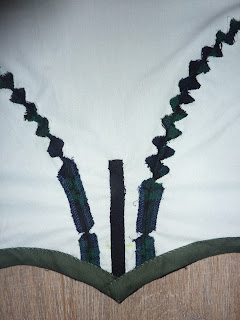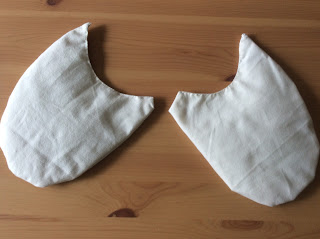When I made my first crinoline day dress I left out the boning and chestpadding. This time I want to try and do everything as authentic as I can. Just ingnore the fact that I used my serger when flatlining the fashion fabric to the lining fabric.😉
The boning center back.
The chestpadding it was quite hard to figure out where to place them.
Looking at lots of pictures of original dresses
like this one found on the All the pretty dresses blog
helped a lot!
You can find my collection of images here:
The Chestpadding and front boning in place.
When I tried the bodice with the sleeves sewn in on I felt like I looked like a football player. The poufs on the sleeves make my upperbody look huge. That combined with the width of the crinoline skirt will hopefully make my waist look tiny. A very neat optical illusion trick, but for now I have my reservations about the poufs!
The first version of this costume
without the poufs.
To pouf or not to pouf, that's the question!
I didn't like my original crinoline it was too big for little me. So I am going to alter it into a smaller version which will be "only" 110" in circumference. I will be using the Truly Victorian pattern TV142, 1856 Walking Cage. Which is more the size of a crinoline cage for daily use according to the information on the History of Fashion and Dress website: " When it comes to the crinolines of the 1860s, bigger is not always better. Contrary to popular belief, the crinolines worn by women of this period were not as wide as folklore (or Scarlett O'Hara) wants us to believe. While the largest period crinoline I have found documented measures a whopping 225" in circumference, the majority of 1860s era extant cages only measure between 90-105" in circumference."
The larger TV141, 1858 Round Cage is better suited for use with a ball gown if you ask me. At least when your as short as me!
The difference between the circumference is only 16", I hope this is enough to make me feel more comfortable and less like a battleship.


















